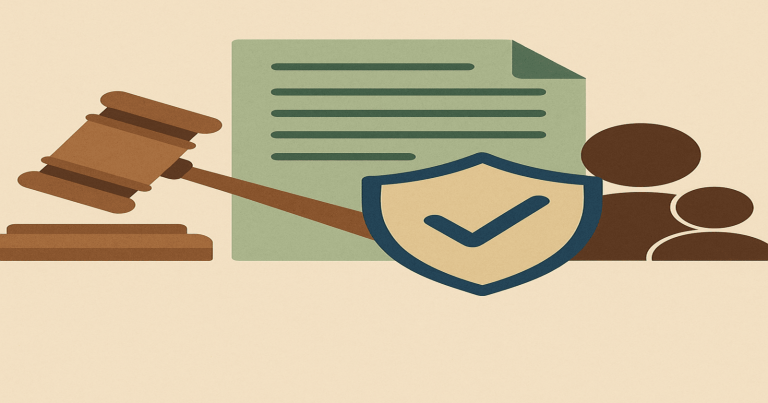In India’s large and fast-changing market, customers face many issues, such as poor product quality, false ads, and unfair prices. To protect consumers, the Consumer Protection Act was passed. So, what is the Consumer Protection Act? It is a legal law that protects buyers from being cheated by businesses. It ensures fair trade and honest information and gives consumers a way to fight back legally if wronged. The latest version, the Consumer Protection Act 2019, replaced the old 1986 law to handle new problems like online shopping fraud, fake reviews, and poor digital services. This Act gives consumers more power, legal rights, and easier access to justice.
What is the Consumer Protection Act?
The Consumer Protection Act is a very important law in India that helps buyers stand up against unfair trade practices. It keeps a balance between business interests and consumer rights.
Definition and Objective of the Act
The Consumer Protection Act is a central government law that protects consumers in India. It first came into effect in 1986 and was later replaced by a stronger and more modern version in 2019. This Act protects anyone who buys goods or uses services for personal use. It does not protect people who buy things for resale or business purposes. The law defines what a consumer is and lists their rights. It also explains how consumers can file complaints when something goes wrong.
The main aim of the Act is to protect consumer rights and help people get justice if they face cheating, fraud, or poor services. It also makes sure that companies behave responsibly. Today, it covers everything from grocery shopping to online purchases, banking, education, transport, and even healthcare services. Businesses are expected to follow the rules strictly, or they can face legal action.
The Act is also a tool to improve product and service quality in the Indian market. With this law in place, sellers, service providers, and even big brands are more careful in their dealings. The law empowers every consumer and encourages transparency and accountability in the market.

Rights of the Consumer Under the Act
Rights are the foundation of this law. Every consumer is given specific legal rights so they can shop or use services without fear of being cheated.
The Consumer Protection Act gives every person six strong rights. These rights cover everything from the safety of the product to customer care.
Right to Safety
This right protects people from goods or services that may be harmful to their health or life. For example, if an electrical appliance or a medicine has a safety issue, the consumer has the right to stop its use and report it. It ensures that all products meet proper quality and safety standards.
Right to be Informed
This right ensures that buyers get full and correct details about the product or service before buying it. This includes price, ingredients, expiry date, instructions, warnings, and more. When customers have full knowledge, they can make better and safer decisions.
Right to Choose
This right makes sure that no one can force or mislead a consumer into buying something. Buyers must have access to a variety of choices at fair prices. Monopolies or pressure-selling tactics are not allowed under this law.
Right to be Heard
Every consumer has the right to express complaints and concerns. Companies are expected to listen and solve problems honestly. This right supports the idea that customers must be treated with respect.
Right to Seek Redressal
If someone receives faulty goods or poor service, they can ask for correction or compensation. This could be a refund, replacement, or cash for damages. The redressal process is made simple and accessible.
Right to Consumer Education
Many people do not know their rights. This right focuses on spreading awareness through campaigns, training, and school programs. It helps people understand how to use the Act for their benefit.
These rights make sure that businesses act responsibly and that consumers are not helpless in any situation.
Responsibilities of the Consumer
Just as buyers have rights, they also have duties. The law only works well if both sides—consumers and businesses—act fairly.
A good consumer is not just someone who knows the law but also uses it responsibly. To make full use of the Consumer Protection Act, every buyer should follow these practices:
Be Informed
Always read the product label, check expiry dates, understand terms and conditions, and look for reviews before buying anything. Awareness helps avoid fraud.
Keep Records
Buyers must keep bills, warranty cards, and delivery receipts. These help prove your case if you need to file a complaint. Lack of proof may weaken your claim.
Use Products Correctly
It’s unfair to blame the seller if the buyer has not followed the usage instructions. Products must be used as per guidelines.
Report Faulty Products
If something goes wrong, report it immediately. Early action can protect others from facing the same issue and also push the company to improve quality.
Avoid False Complaints
Filing fake or exaggerated complaints is a misuse of the law. It causes delays in justice for those who are truly wronged.
When consumers are responsible, it creates a more trustworthy market for everyone.
Importance of Consumer Protection Act
The Consumer Protection Act plays a vital role in building a fair and safe market. It gives buyers confidence and keeps companies on their toes.
India has millions of buyers from different income levels and educational backgrounds. Many of them are not aware of their rights. In such a situation, the Consumer Protection Act helps people speak up against injustice. It makes companies follow rules and improves the quality of goods and services. Here’s why this Act is important:
- Protects Against Cheating: Stops sellers from giving poor-quality goods, charging extra, or showing fake ads.
- Gives Legal Strength: Empowers every person to take legal action without needing a lawyer.
- Encourages Ethical Business: Forces companies to be transparent, fair, and responsible in how they deal with customers.
- Improves Product Quality: Businesses improve quality to avoid fines and court cases.
- Covers Online Buyers Too: The 2019 Act protects those who shop online by including e-commerce fraud and fake reviews.
- Boosts Confidence: Buyers feel secure knowing that the law will help them if things go wrong.
- Easy Complaint Process:With the launch of online portals like edaakhil.nic.in, filing a complaint is now simple and fast.
This Act is one of the strongest tools a consumer has in India today.
Redressal of Consumer Complaints
When a problem happens, the Act gives a proper system to solve it. This system is fast, fair, and does not cost much.The Consumer Protection Act has a three-level redressal system that helps people at local, state, and national levels. Depending on the amount of money involved in the complaint, a person can approach a suitable forum.
1. District Consumer Disputes Redressal Commission (DCDRC)
- Deals with claims up to ₹1 crore.
- Available in every district of India.
- Handles most local consumer complaints quickly.
2. State Consumer Disputes Redressal Commission (SCDRC)
- Handles cases where claims are above ₹1 crore and up to ₹10 crore.
- Also hears appeals from the District Commission.
- Located in the state capital.
3. National Consumer Disputes Redressal Commission (NCDRC)
- Handles cases where claims are above ₹10 crore.
- Also deals with appeals from the State Commission.
- Located in New Delhi and is the highest body for consumer justice.
4. Other Helpful Redressal Tools
- e-Daakhil Portal: Consumers can now file cases online from home. This makes it faster and easier for people to get help.
- Mediation Cells: These are set up to solve problems without going to court. Both parties can agree and solve the issue peacefully.
- Product Liability Claims: If a faulty product causes injury, loss, or damage, the buyer can claim compensation.
- Penalties and Fines: If a company is found guilty, the court can order it to refund the money, replace the product, or pay for damages. It can also fine companies for repeated offences.
The redressal system ensures justice is not only possible but also simple and affordable.
What is the Consumer Protection Act FAQs
Q1. What is the Consumer Protection Act?
It is a law that protects buyers from being cheated and gives them a way to get justice through legal channels.
Q2. Who is considered a consumer under this Act?
Anyone who buys goods or uses services for personal use is a consumer. Business purchases are not included.
Q3. What are the six rights of a consumer?
They are:
- Right to Safety
- Right to be Informed
- Right to Choose
- Right to be Heard
- Right to Seek Redressal
- Right to Consumer Education
Q4. What is the time limit for filing a complaint?
A complaint should be filed within 2 years from the date of the problem. Some delays may be allowed for the proper reason.
Q5. Can I file a complaint without a bill?
Yes, you can. But a bill or proof of purchase like a bank slip or delivery receipt makes your case stronger.
Q6. Does the Act apply to online purchases?
Yes. The 2019 version of the Act includes e-commerce and protects buyers from online fraud.
Q7. Can a minor file a complaint under this Act?
Minors can file complaints through a guardian or legal representative.


